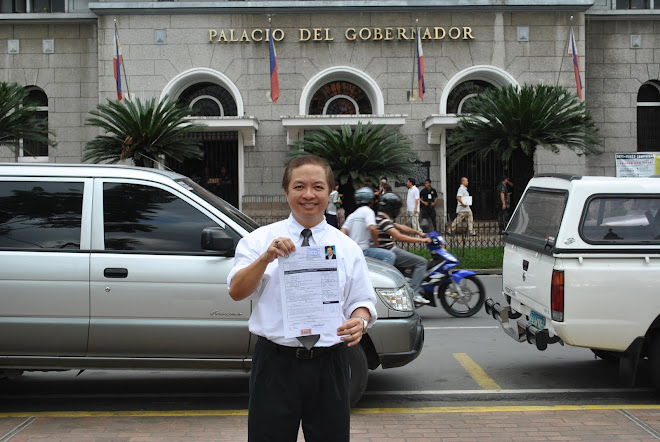Sunday, April 26, 2009
Problem is pork, not more solons
Problem is pork, not more solons
By Mr. de Quiros, Philstar
Several lawmakers have long wished to raise the number of seats in the House of Reps. So when the Supreme Court ruled last week to include 33 more party-list reps to the present 22, they took it as a cue. A bill came up in the Senate proposing a hundred additional seats to the present 238, while a House counterpart would make it an even 300.
The Constitution requires 20 percent of House seats allocated to the party list. So Speaker Prospero Nograles says 300 suits the Tribunal’s new seating of 55 party-list reps, as 20 percent of 300 is 60. Actually the Charter also sets the number of House seats at 250, subject to increase by Congress. But with 250 total, party-list seats would be limited to 50, five short of the Court’s new ruling. Nograles’s 300 is just about right.
At once critics howled. Allegedly it would only be wasting taxpayer money to add 33 new party-list reps, or make the total seats 300. At least P35,000 a month will be spent for each one’s salary, plus P300,000 for field office rent, utilities, representation, travel, staffing, etc. Better to lessen the number of reps or abolish the House altogether, they hooted.
The outcry is understandable. Citizens increasingly are spending on a Congress that is churning out less and less laws. And the laws of late have been of poor quality. Pending in both Senate and House, for one, is a right-of-reply bill that illegally would curb press freedom. Despite worsening poverty, legislators would be unable to point out even just one law passed recently to uplift Filipinos.
But the critics are barking up the wrong tree. It’s not bad to raise the number of reps. In theory the more reps putting their heads together, the better their output. The US has 435 reps for its 303-million population. India has 544 members of parliament for its billion people. Britain, where modern parliament evolved, has 646 MPs for 61 million people.
It’s also time to reapportion the elective congressional districts, by breaking up giant ones. The Constitution promotes one district for every 250,000 population. Too, new districts may be formed within three years of the last census. But Congress has never re-districted since the 1987 Charter ratification; new districts have been created only because of births of new cities and provinces. One district long begging to be broken up into six is Quezon City’s 2nd, consisting of 1.6 million residents and 600,000 voters. That would mean less moneyed candidates able to run against zillionaires. (This is not to push the splitting of Camarines Sur’s 2nd district. It is being done only to accommodate a presidential son and a returning ally, but the resulting districts would have less than the required 250,000 residents.)
What should be removed is the pork barrel: P70 million a year per congressman, P200 million a year per senator. Pork is the root of corruption in Congress. It is the reason why candidates overspend by the hundreds of millions of pesos, cheat and kill during election campaigns. From the pork crooked legislators pocket 20-25 percent. One greedier senator demands 55-percent cut from his pork projects: 50 percent for himself, 5 percent for his chief of staff. And yet the pork has no constitutional basis.
Just imagine if congressional pork were eliminated. Only candidates who sincerely want to serve the people would be left.
(Comment: Agree! There are few hundred corrupt government officials and a handful of good ones in our government. Sadly, most of our people have no BALLS to kick them out from office and help better their lives. Hay, kelan pa kaya tayo magkakalakas loob na baguhin ito?)
By Mr. de Quiros, Philstar
Several lawmakers have long wished to raise the number of seats in the House of Reps. So when the Supreme Court ruled last week to include 33 more party-list reps to the present 22, they took it as a cue. A bill came up in the Senate proposing a hundred additional seats to the present 238, while a House counterpart would make it an even 300.
The Constitution requires 20 percent of House seats allocated to the party list. So Speaker Prospero Nograles says 300 suits the Tribunal’s new seating of 55 party-list reps, as 20 percent of 300 is 60. Actually the Charter also sets the number of House seats at 250, subject to increase by Congress. But with 250 total, party-list seats would be limited to 50, five short of the Court’s new ruling. Nograles’s 300 is just about right.
At once critics howled. Allegedly it would only be wasting taxpayer money to add 33 new party-list reps, or make the total seats 300. At least P35,000 a month will be spent for each one’s salary, plus P300,000 for field office rent, utilities, representation, travel, staffing, etc. Better to lessen the number of reps or abolish the House altogether, they hooted.
The outcry is understandable. Citizens increasingly are spending on a Congress that is churning out less and less laws. And the laws of late have been of poor quality. Pending in both Senate and House, for one, is a right-of-reply bill that illegally would curb press freedom. Despite worsening poverty, legislators would be unable to point out even just one law passed recently to uplift Filipinos.
But the critics are barking up the wrong tree. It’s not bad to raise the number of reps. In theory the more reps putting their heads together, the better their output. The US has 435 reps for its 303-million population. India has 544 members of parliament for its billion people. Britain, where modern parliament evolved, has 646 MPs for 61 million people.
It’s also time to reapportion the elective congressional districts, by breaking up giant ones. The Constitution promotes one district for every 250,000 population. Too, new districts may be formed within three years of the last census. But Congress has never re-districted since the 1987 Charter ratification; new districts have been created only because of births of new cities and provinces. One district long begging to be broken up into six is Quezon City’s 2nd, consisting of 1.6 million residents and 600,000 voters. That would mean less moneyed candidates able to run against zillionaires. (This is not to push the splitting of Camarines Sur’s 2nd district. It is being done only to accommodate a presidential son and a returning ally, but the resulting districts would have less than the required 250,000 residents.)
What should be removed is the pork barrel: P70 million a year per congressman, P200 million a year per senator. Pork is the root of corruption in Congress. It is the reason why candidates overspend by the hundreds of millions of pesos, cheat and kill during election campaigns. From the pork crooked legislators pocket 20-25 percent. One greedier senator demands 55-percent cut from his pork projects: 50 percent for himself, 5 percent for his chief of staff. And yet the pork has no constitutional basis.
Just imagine if congressional pork were eliminated. Only candidates who sincerely want to serve the people would be left.
(Comment: Agree! There are few hundred corrupt government officials and a handful of good ones in our government. Sadly, most of our people have no BALLS to kick them out from office and help better their lives. Hay, kelan pa kaya tayo magkakalakas loob na baguhin ito?)
Subscribe to:
Comments (Atom)









